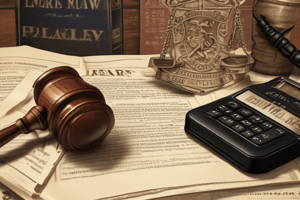Podcast
Questions and Answers
Under F.S.§856.021, what is a circumstance that may warrant a justifiable and reasonable alarm or immediate concern for the safety of persons or property?
Under F.S.§856.021, what is a circumstance that may warrant a justifiable and reasonable alarm or immediate concern for the safety of persons or property?
- The person takes flight upon appearance of a law enforcement officer. (correct)
- The person is carrying a suitcase.
- The person is talking on their phone.
- The person is walking in a busy street during the day.
What must a law enforcement officer do before arresting a person for loitering or prowling?
What must a law enforcement officer do before arresting a person for loitering or prowling?
- Search the person and their belongings.
- Call for backup.
- Afford the person an opportunity to dispel any alarm or immediate concern. (correct)
- Read the person their Miranda rights.
What is the consequence of a law enforcement officer failing to comply with the procedure before arresting a person for loitering or prowling?
What is the consequence of a law enforcement officer failing to comply with the procedure before arresting a person for loitering or prowling?
- The person will be released with a warning.
- The person will be fined.
- The person will be arrested regardless.
- The person cannot be convicted of an offense under this section. (correct)
What is the degree of misdemeanor for violating F.S.§856.021?
What is the degree of misdemeanor for violating F.S.§856.021?
Under what circumstances can a law enforcement officer make a warrantless arrest for loitering or prowling?
Under what circumstances can a law enforcement officer make a warrantless arrest for loitering or prowling?
What is a factor that may dispel any alarm or immediate concern for the safety of persons or property?
What is a factor that may dispel any alarm or immediate concern for the safety of persons or property?
Has F.S.§856.021 been held to be constitutional?
Has F.S.§856.021 been held to be constitutional?
What must a law enforcement officer give to the person before affording them the opportunity to dispel any alarm or immediate concern?
What must a law enforcement officer give to the person before affording them the opportunity to dispel any alarm or immediate concern?
What is required for an arrest to be legal under §856.021?
What is required for an arrest to be legal under §856.021?
What is required of an officer to articulate specific facts showing imminent breach of the peace or threat to public safety?
What is required of an officer to articulate specific facts showing imminent breach of the peace or threat to public safety?
What constitutes loitering or prowling under F.S.§856.021?
What constitutes loitering or prowling under F.S.§856.021?
Which scenario may NOT represent a justifiable alarm or immediate concern for safety?
Which scenario may NOT represent a justifiable alarm or immediate concern for safety?
What factor contributes to a situation being considered loitering or prowling?
What factor contributes to a situation being considered loitering or prowling?
What type of behavior is specifically described as unlawful under the loitering and prowling law?
What type of behavior is specifically described as unlawful under the loitering and prowling law?
Which of the following best describes the intent behind the loitering and prowling law?
Which of the following best describes the intent behind the loitering and prowling law?
What action may indicate that a person poses an alarm or immediate concern to law enforcement?
What action may indicate that a person poses an alarm or immediate concern to law enforcement?
What must a law enforcement officer do before making an arrest for loitering or prowling?
What must a law enforcement officer do before making an arrest for loitering or prowling?
Which of the following behaviors demonstrates a person's intent to conceal?
Which of the following behaviors demonstrates a person's intent to conceal?
In which situation is an officer permitted to arrest without prior identification of the individual?
In which situation is an officer permitted to arrest without prior identification of the individual?
Which of the following is NOT considered a valid circumstance that may justify alarm for law enforcement?
Which of the following is NOT considered a valid circumstance that may justify alarm for law enforcement?
What must a law enforcement officer do before allowing a person to dispel any alarm?
What must a law enforcement officer do before allowing a person to dispel any alarm?
Under what condition must a law enforcement officer provide Fifth Amendment rights with loitering and prowling?
Under what condition must a law enforcement officer provide Fifth Amendment rights with loitering and prowling?
What is the legal implication for a person found guilty of violating the provisions of loitering and prowling?
What is the legal implication for a person found guilty of violating the provisions of loitering and prowling?
What must happen for an arrest for loitering and prowling to be considered legal?
What must happen for an arrest for loitering and prowling to be considered legal?
Flashcards are hidden until you start studying
Study Notes
Loitering and Prowling under F.S.§856.021
- It is unlawful for any person to loiter or prowl in a place, at a time, or in a manner not usual for law-abiding individuals, under circumstances that warrant justifiable and reasonable alarm or immediate concern for the safety of persons or property in the vicinity.
Circumstances Warranting Alarm or Immediate Concern
- The person takes flight upon appearance of a law enforcement officer.
- Refuses to identify himself.
- Manifestly endeavors to conceal himself or any object.
Officer's Procedure Before Arrest
- Unless flight or other circumstances make it impracticable, a law enforcement officer must afford the person an opportunity to dispel any alarm or immediate concern before making an arrest.
- The officer must request that the person identify himself and explain his presence and conduct.
Fifth Amendment Rights
- A law enforcement officer must give the person his or her Fifth Amendment rights before affording the person the opportunity to dispel any alarm.
Conviction Requirements
- No person shall be convicted of an offense under this section if the law enforcement officer did not comply with the procedure or if it appears at trial that the explanation given by the person is true and, if believed by the officer at the time, would have dispelled the alarm or immediate concern.
Constitutionality of F.S.§856.021
- The statute has been held to be constitutional (Watts v. State, 463 So.2d 205 (Fla. 1985)).
- However, it must be applied with special care (Carroll v. State, 573 So.2d 148 (Fla. 2d DCA 1991)).
Requirements for a Legal Arrest
- All elements of the misdemeanor offense of loitering and prowling must occur in the presence of the arresting officer for the arrest to constitute a legal arrest.
Case Law Examples
- Riding a bicycle in the early afternoon on a public road while carrying a bag does not constitute loitering and prowling (Carter v. State, 516 So.2d 312 (Fla. 3d DCA 1987)).
- Standing in a commercial shopping center at 11:30 p.m. and pulling on business's rear door handles to see if door would open constitutes loitering and prowling (M.R. v. State, 101 So. 3d 389 (Fla. 3d DCA 2012)).
- Standing, smoking, and talking to another man in the rear corner of a bar parking lot at 11:30 p.m. is insufficient reasonable cause for a stop (Barna v. State, 636 So.2d 571 (Fla. 4th DCA 1994)).
- Lurking in the dark by residences in the wee hours of the morning is unusual for law-abiding persons and constitutes loitering and prowling (Battle v. State, 868 So.2d 587 (Fla. 4th DCA 2004)).
Loitering and Prowling Laws
- Loitering refers to lingering in a location without a clear purpose, particularly in a suspicious manner.
- Prohibits individuals from loitering or prowling in a way that deviates from typical, law-abiding behavior.
- The law aims to address situations that may arouse "justifiable and reasonable alarm" among nearby people.
- Circumstances contributing to alarm include time, place, and manner of presence in the area.
- Individuals engaging in such behavior can raise immediate concern for the safety of persons or property.
- Enforcement of this law is focused on maintaining public order and safety.
Determining Alarm or Immediate Concern
- Indicators of alarm include a person's flight upon seeing a law enforcement officer.
- Refusal to identify oneself can heighten immediate concern for officers.
- Attempts to conceal oneself or objects may suggest suspicious behavior.
Law Enforcement Officer Protocol
- Officers must give individuals a chance to clarify any alarming behavior before an arrest.
- This includes requesting identification and an explanation for their actions and presence.
- The need for this request may be waived if immediate circumstances, such as flight, make it impractical.
Loitering and Prowling Law (F.S. §856.021)
- It is illegal to loiter or prowl under circumstances that may provoke alarm for public safety or property.
- Factors contributing to alarm include fleeing from law enforcement, refusing to identify oneself, or attempting to conceal oneself or an object.
- Officers must provide individuals the opportunity to explain their presence before arrest, unless impractical due to flight or other circumstances.
- Officers are required to inform individuals of their Fifth Amendment rights prior to asking for identification.
Legal Enforcement and Arrests
- No conviction can occur if the officer did not follow proper procedure or if the individual’s truthful explanation could have dispelled concern.
- Officers can arrest suspected loiterers or prowlers without a warrant if obtaining one would likely allow the suspect to escape.
- The statute is constitutional but must be applied cautiously due to potential overreach.
- Officers must articulate specific facts to demonstrate a threat to peace or safety for lawful arrest.
Judicial Precedents
- All elements of loitering and prowling must be witnessed by the arresting officer for the arrest to be valid.
- Examples of insufficient cause include a person riding a bicycle during the day, which did not warrant probable cause for arrest.
- Observations of juveniles engaging in suspicious nighttime activity can lead to adjudication of delinquency.
- In a case involving a late-night parking lot encounter, the lack of reasonable suspicion led to evidence suppression.
- Lurking in dark areas near residences at unusual hours can establish reasonable suspicion of loitering.
Comparisons and Case References
- The U.S. Supreme Court upheld a Nevada law analogous to F.S. §856.021, reinforcing the obligation of suspects to disclose their identity during valid stops.
- Cases illustrate the judicial interpretation of loitering based on specific behaviors and the context of the situation.
- Loitering is characterized by timing, location, and manner often contrasted with the behavior of law-abiding citizens.
Loitering and Prowling Under F.S. §856.021
- Loitering and prowling are prohibited when behavior is unusual for law-abiding individuals and raises reasonable alarm regarding safety.
- Factors indicating alarm may include taking flight when an officer appears, refusal to identify oneself, or attempts to conceal oneself or items.
- Law enforcement must allow the individual a chance to explain their actions before an arrest, barring circumstances such as flight that make this impractical.
Rights and Procedure
- Individuals have Fifth Amendment rights, which officers must communicate prior to requests for identification or explanations.
- Failure of law enforcement to follow these procedures could lead to dismissal of charges if the person's explanation is true and would have alleviated the concern.
Legal Consequences
- Violations of F.S. §856.021 are classified as a misdemeanor of the second degree.
- Officers can make warrantless arrests if obtaining a warrant might allow the suspect to escape.
Case Law Interpretations
- The statute has been upheld as constitutional, requiring careful enforcement.
- Officers must articulate specific facts showing a threat to public safety or a potential breach of peace to justify enforcement actions.
- All elements of loitering and prowling must be observable by the arresting officer for the arrest to be valid.
Notable Cases
- In Carter v. State, riding a bicycle while carrying a bag during the afternoon was insufficient to establish probable cause.
- In M.R. v. State, a juvenile observed testing door handles after hours in a shopping center warranted a delinquency adjudication.
- Barna v. State determined insufficient evidence leading to the suppression of narcotics found during a stop of an individual in a parking lot.
- In Battle v. State, lurking in the dark near residences in the early morning was deemed suspicious behavior justifying reasonable suspicion.
- The U.S. Supreme Court's Hiibel decision affirmed the requirement for individuals to disclose identity during lawful stops, comparable to F.S. §856.021.
Overview of F.S. §856.021
- It is unlawful to loiter or prowl under circumstances raising alarm for safety.
- Loitering or prowling is defined as being in a place or manner not typical for law-abiding individuals.
Determining Factors for Alarm
- Factors warranting alarm include:
- Taking flight upon the appearance of law enforcement.
- Refusing to identify oneself.
- Attempting to conceal oneself or any object.
Law Enforcement Procedures
- Officers must provide an opportunity to explain presence before arrest unless flight makes this impractical.
- Officers must inform individuals of their Fifth Amendment rights before requesting identification.
Legal Consequences
- Violators are guilty of a second-degree misdemeanor.
- Lack of adherence to proper procedures by law enforcement can lead to dismissal of charges if the explanation given dispels alarm.
Special Considerations
- The statute must be applied carefully due to its constitutional implications.
- Officers must demonstrate specific facts indicating an imminent breach of peace or public safety.
Legal Case Examples
- Carter v. State: Riding a bicycle in daylight does not establish probable cause for loitering.
- M.R. v. State: Juvenile attempting to open multiple doors late at night justified suspicion of loitering.
- Barna v. State: Insufficient cause for stopping someone in a parking lot late at night; evidence suppressed.
- Battle v. State: Suspicion confirmed when individual was lurking in dark near residences at an unusual hour.
Comparisons to Other Legal Standards
- U.S. Supreme Court upheld similar laws in Hiibel v. Sixth Judicial District Court, emphasizing the obligation to disclose identity during valid stops.
Implications for Law Enforcement
- All elements of the crime must be present for a valid arrest.
- Officers must be able to articulate reasonable suspicion based on observations.
Studying That Suits You
Use AI to generate personalized quizzes and flashcards to suit your learning preferences.




